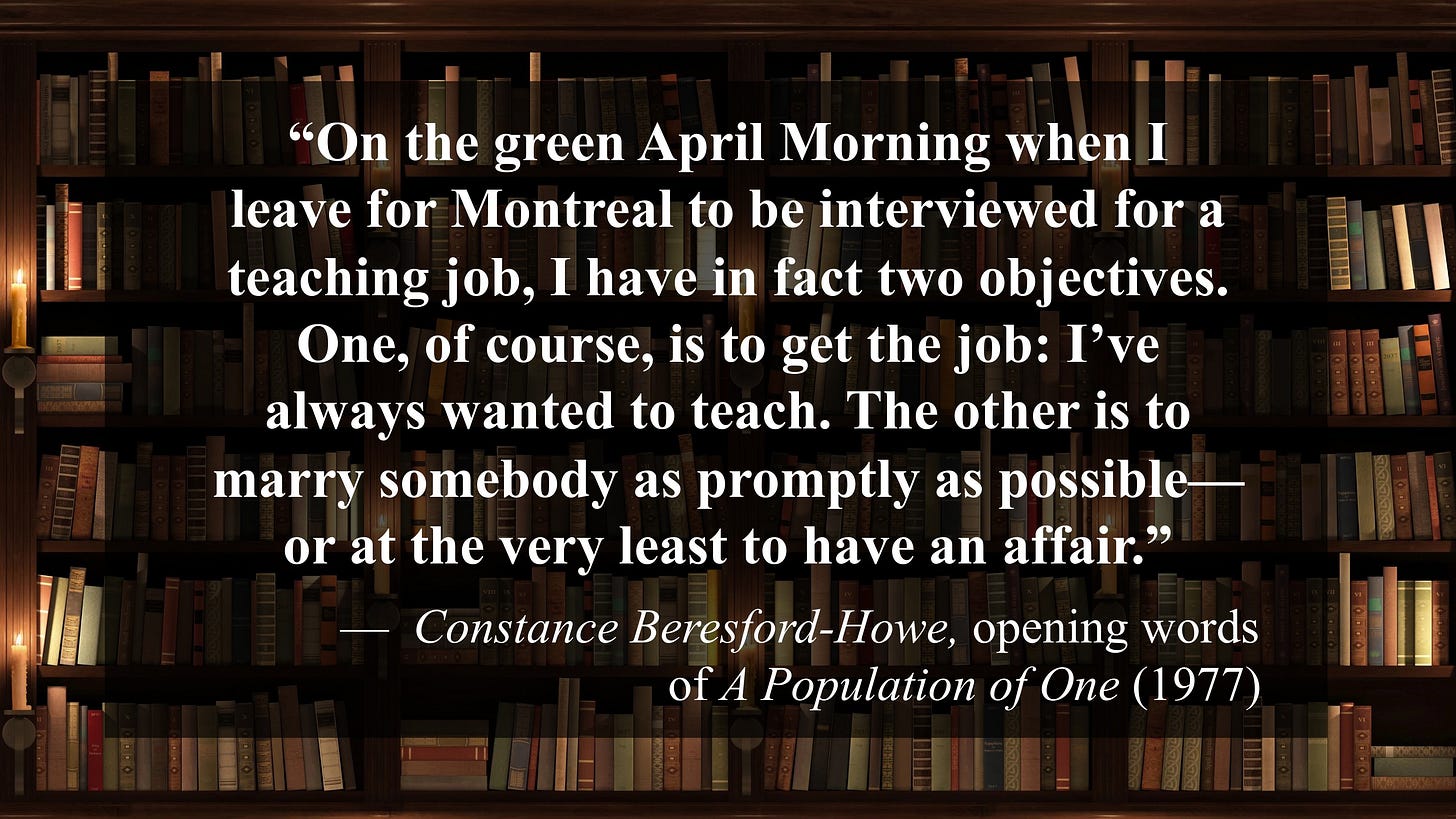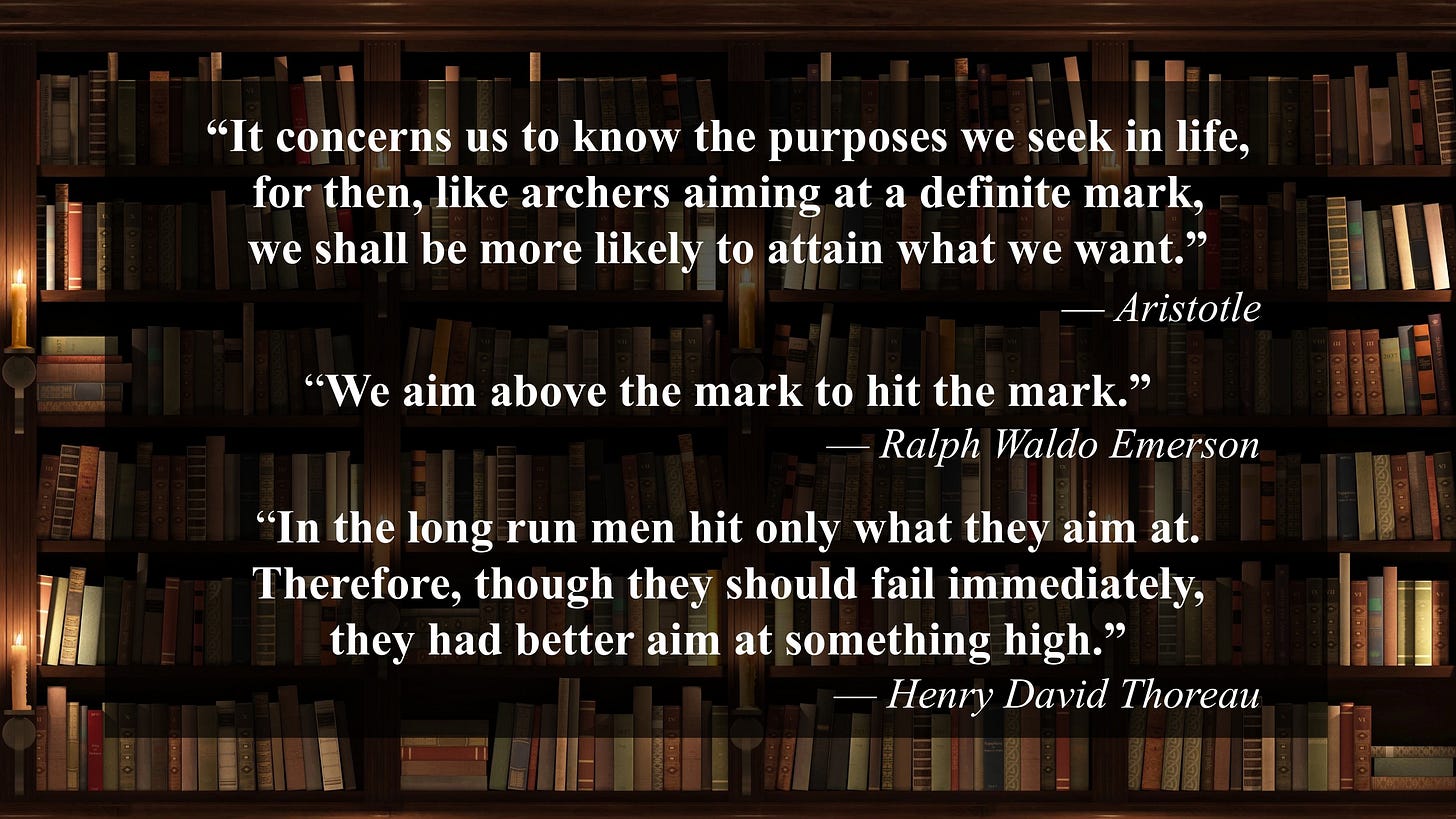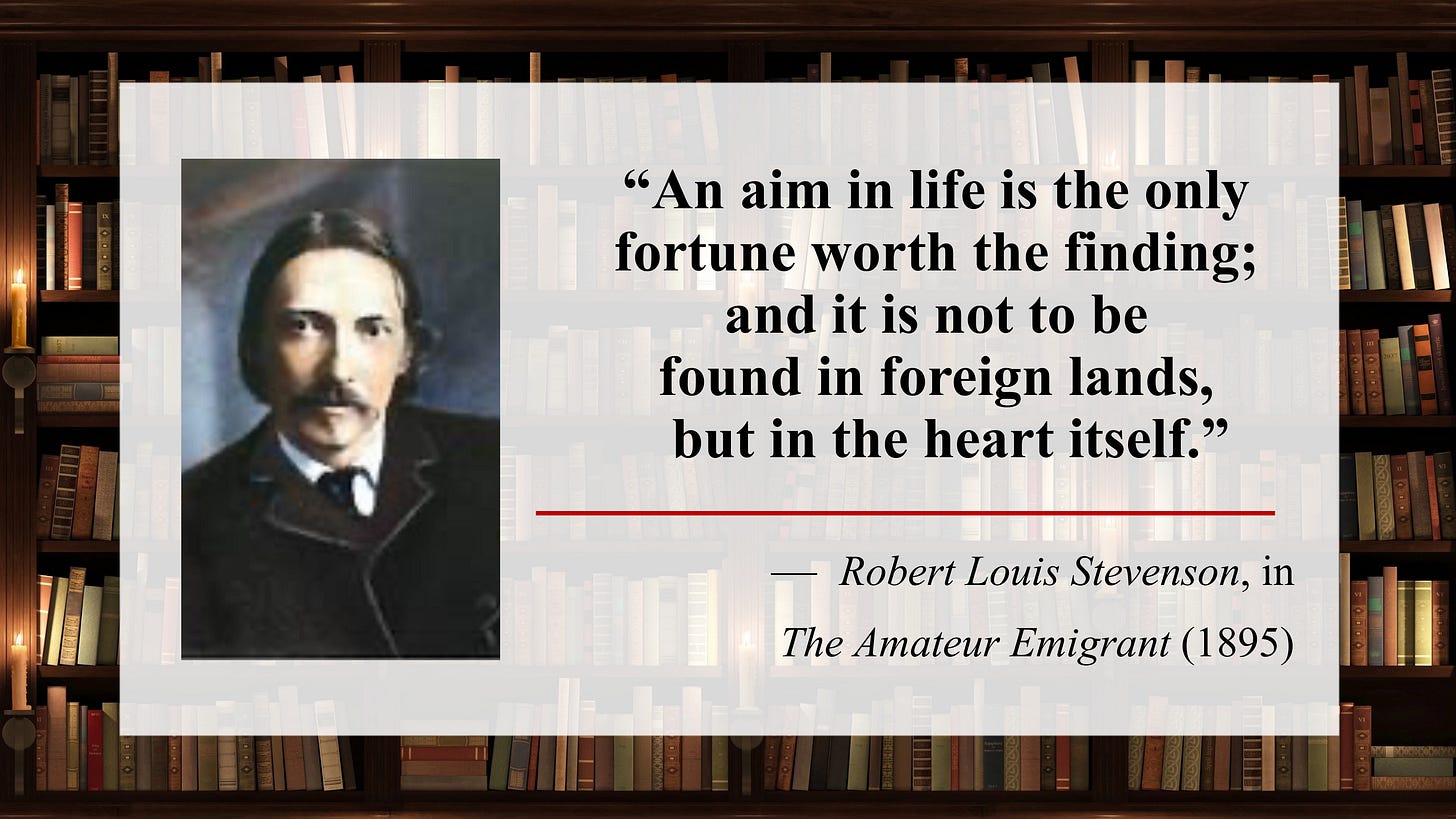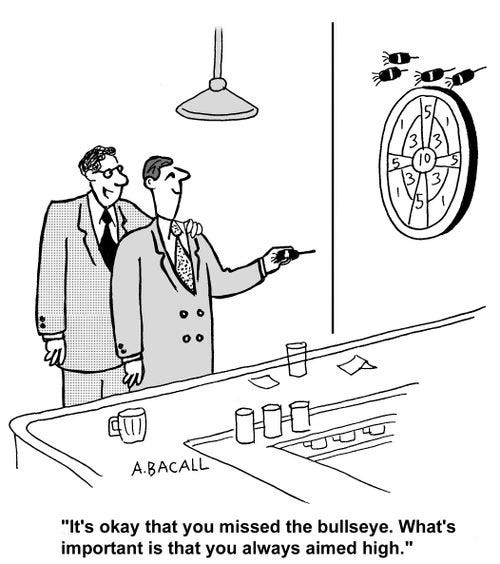Dr. Mardy's Quotes of the Week ("Aims & Aiming")
May 25—31, 2025 | THIS WEEK'S THEME: “Aims & Aiming”
On Memorial Day, we pay tribute to the brave men and women of the armed forces who died in service to our nation. To honor the occasion, I’m pleased to feature a 9-minute PBS News Hour video of the Changing of the Guard ceremony at Arlington National Cemetery. If you’ve never had the privilege of witnessing it, prepare to be moved. Simply double-click the link below:
Opening Line of the Week
A key purpose of a novel’s opening paragraph is to establish the “voice” of the protagonist, and Beresford-Howe does that very nicely here with Wilhelmina “Willy” Doyle, a 30-year-old Canadian woman who fears she is a spinster-in-the-making. As Willy departs her small Ontario town for whatever awaits her in the city, there’s a clear suggestion that she’s embarking on the journey of a lifetime.
While the desire to find a husband or have an affair doesn’t exactly seem like a lofty aim, it is an intriguing one—and so important to Willy that she gave it a formal name. She continued in the first paragraph;
“This latter plan is new. I have labelled it The Project, a phrase light enough to keep Fate and me both safely defused, or so I hope.”
For nearly 2,000 memorable opening lines from every genre of world literature, go to www.GreatOpeningLines.com.
This Week’s Puzzler
On June 1, 1924, this man was born into a prominent American family (his grandfather founded a famous furniture manufacturing company, his father was president of the Metropolitan Museum of Art, and his uncle was president of Union Theological Seminary). After graduating from the prestigious Phillips Academy in 1942, he briefly entered Yale University, but soon ended his studies to fight in WWII. He served in the U.S. Army until 1947, when he retired as an Army captain.
After the war, he returned to Yale, where he majored in philosophy and religious studies. He also participated in a variety of extra-curricular activities, including the famous Yale Glee Club. During his senior year, his childhood friend George H. W. Bush was instrumental in helping him gain admittance to the exclusive Skull and Bones secret society.
After earning a B.A. degree in 1949, he spent a year at the Union Theological Seminary before leaving to help fight in the Korean War. This time, though, he did it as a case officer in the CIA. After three years, however, he resigned after becoming disillusioned by the many morally questionable practices of the organization. He quickly entered Yale Divinity School, and was ultimately ordained as a Presbyterian minister in 1956.
He went on to become one of the most famous clergyman of his era, a popular Chaplain at Yale University, the Senior Minister at Manhattan’s Riverside Church, and an influential social activist who was centrally involved in both the Civil Rights Movement and the massive groundswell of opposition to the war in Vietnam.
While serving as chaplain at Yale, he was a charismatic figure who profoundly influenced scores of students, including the political cartoonist Garry Trudeau who wrote about him this way: “Without him, the very air would have lost its charge. With him, we were changed forever.” Trudeau went on to keep the memory of his mentor alive by caricaturing him as “The Rev. Scot Sloan” in his Doonesbury cartoon strip.
In a 1999 book, this week’s Mystery Man provided an intriguing view into his priorities when he wrote:
When I first came upon this quotation a few years ago, I was immediately struck by the richness of the paltriness of aim phrase. I also greatly admired how cleverly it employed the word paltry to describe embarrassingly low aims in life. I later learned that the phrase was almost certainly our Mystery Man’s characterization of what de Tocqueville thought rather than a direct quotation. While the phrase has not been found in any of de Tocqueville’s work, it does appear to accurately describe what he believed about the aspirations of everyday Americans. In his classic Democracy in America (1833), he wrote:
“No Americans are devoid of a yearning desire to rise, but hardly any appear to entertain hopes of great magnitude or to pursue very lofty aims.”
De Tocqueville believed that Americans were ambitious, but they tended to focus on the acquisition of “property, power, and reputation” rather than more noble goals, like the pursuit of justice or a striving for moral excellence.
In his memorable paltriness of aims characterization, this week’s Mystery Man showed that he was in substantial agreement with de Tocqueville’s position.
Who is this person?
What Role Have “Aims” and “Aiming” Played in Your Life?
In English, the word aim is both a noun and a verb, and both have their origin in the ancient practice of archery, where the challenge has always been to accurately estimate the speed and trajectory of an arrow aimed at a target.
Aim has a fascinating etymology. Historically the verb came first, deriving from the Latin aestimāre, originally meaning, “to assess, reckon, or appraise.” Over time, aestimāre evolved into the Old French word esmer or aesmer, meaning “to estimate.” When the French term was incorporated into Old English, it became aimen, and took on the meaning of “directing a weapon or an effort toward a target.”
As the centuries passed, the verb form was extended from a physical action to a mental one, as in “The king’s aim was to capture and occupy his opponent’s castle.” And this development laid the groundwork for yet another fascinating transition, where aim began to be used to describe both the action of aiming (a verb) as well as a purpose or intention (a noun).
This evolution from the concrete to the abstract—which is also a movement from the literal to the metaphorical—is quite common in English. Just as the word grasp evolved from holding a physical object in one’s hand to understanding an abstract concept, aim moved from directing a weapon at a target to expressing an intention in life. And this is one of the reasons why so many quotations about human aims have an underlying connection to archery.
If you have an aim in your life, that means, by definition, that you also have a target—and that very fact is almost invariably regarded as something that can enrich your life. The Scottish writer Robert Louis Stevenson expressed it well in a posthumously-published collection of his travel essays:
Here, Stevenson describes an aim as one of humanity’s greatest treasures. In the concluding line, he also clearly suggests that if people wish to find an aim in their lives, they must begin by looking deep inside themselves.
So, what does it mean, exactly, to find an aim in life? Upon first examination, it’s not crystal clear, but that has never stopped people from writing passionately about the value of lofty aims. In an 1837 address to the Phi Beta Kappa Society at Harvard College, Ralph Waldo Emerson said:
“The day is always his, who works in it with serenity and great aims.”
And in an 1809 poem, William Wordsworth wrote:
“A noble aim,/Faithfully kept, is as a noble deed,/In whose pure sight all virtue doth succeed.”
Over the years, writers have written equally passionately about low—or paltry—aims. In a 1948 poem, James Russell Lowell wrote:
“Not failure, but low aim, is crime.”
And there’s a good chance that, sometime over the past few decades, you might have come across this observation as well:
“The greater danger for most of us lies not in setting our aim too high and falling short, but in setting our aim too low and achieving our mark.”
For decades, this quotation has been attributed to both Michelangelo and Leonardo da Vinci, but nothing close to it has ever been found in the writings of either man. For understandable reasons, it’s become one of the most popular things ever said on the subject of aims and aiming—but if you ever choose to use it, make sure you attribute it to “Author Unknown.”
To better understand what it means to have an aim in life, we must turn to familiar concepts. Aims are related to having a sense of purpose or mission—something that gives meaning to our existence. They’re also often related to having a goal—especially an aspirational goal—or a raison d'être, the French expression for “a reason for being.” Aims reflect our interests, values, and priorities—and the kind of impact we hope to make in the world. They offer a glimpse into our deepest hopes and yearnings, what we find meaningful and worth striving for.
An aim in life can also be our answer to questions like “What is your purpose in life?” And, seen from this perspective, one cannot help but think about Friedrich Nietzsche’s immortal words on the importance of having a why of life:
Some aims involve a highly specific target—like the strong feeling I had at age 17 that I would one day become a psychologist, or the even earlier inclinations of young children to become doctors, teachers, nurses, veterinarians, or firefighters. Sometimes, an aim is a combination of a wish, a hope, and a dream—like my aim, first fully articulated 25 years ago when I launched Dr. Mardy's Dictionary of Metaphorical Quotations, to become one of the world’s most respected quotation anthologists.
The truth is that people have multiple aims over the course of a long life, and that is certainly the case with me. When I began posting this weekly newsletter many years ago, it was part of an aim “to enrich the lives of others.” And the inspiration for that aim came from a 1913 speech President Woodrow Wilson delivered to students at Swarthmore College. After saying, “Do not forget why you are here,” he said:
“You are not here merely to prepare to make a living. You are here in order to enable the world to live more amply, with greater vision, with a finer spirit of hope and achievement. You are here to enrich the world, and you impoverish yourself if you forget the errand.”
There are many people who believe that one of the secrets of life is simply having a great aim—even if what is being sought is never actually achieved. Robert Browning is one such person, and he expressed it beautifully in one of his most famous poems:
In the poem, Browning presents a dialogue between Bishop Blougram and a journalist. In the passage above, the bishop advances the idea that a great aim is valuable in itself, regardless of the outcome, and he illustrated the idea by adding, “Try to be Shakespeare, leave the rest to fate!”
Let me bring my remarks to a close this week by asserting that the best way to understand the significance of an aim in life is to examine the lives of people who don’t have one. If life is a journey, people without an aim have no clear destination, and no reliable way to know whether they are on course or have lost their way.
An aim is like a North Star, essential if we’re to navigate effectively on our journey. And if we don’t have something to guide our efforts, the odds dramatically increase that we will drift—as they say, aimlessly—through life.
This week, take a few moments to think about the role that aims and aiming have played in your life. You might also want to spend a little time thinking about how any of this might apply to a young person in your world—a child, a grandchild, or another special person. Simply forward a copy of this week’s newsletter to them along with a note that says, “I’d love to discuss this topic with you one day.” Before doing anything, though, take a few moments to peruse this week’s selection of quotations on the subject:
Everyone needs something to aim for. You can call it a challenge, or you can call it a goal. It is what makes us human. It was challenges that took us from being cavemen to reaching for the stars. — Richard Branson
An ignorance of means may minister/To greatness, but an ignorance of aims/Makes it impossible to be great at all. — Elizabeth Barrett Browning
Make no little plans; they have no magic to stir men’s blood and probably themselves will not be realized. Make big plans; aim high in hope and work. — Daniel Burnham
The person who makes a success of living is the one who sees his goal steadily and aims for it unswervingly. That is dedication. — Cecil B. De Mille
Higher aims are in themselves more valuable, even if unfulfilled, than lower ones quite attained. — Johann Wolfgang von Goethe
Be winged arrows, aiming at fulfillment and goal, even though you will tire without having reached the mark. — Paul Klee
The aims of life are the best defense against death. — Primo Levi
Aim at Heaven and you will get earth “thrown in”: aim at earth and you will get neither. — C. S. Lewis
It is not where you start but how high you aim that matters for success. — Nelson Mandela
That aim in life is highest which requires the highest and finest discipline. —Henry David Thoreau
For source information on these quotations, and many others on the topic of AIMS & AIMING, go here.
Cartoons of the Week:
Answer to This Week’s Puzzler:
William Sloane Coffin (1924 – 2006)
Dr. Mardy’s Observation of the Week:
Thanks for joining me again this week. See you next Sunday morning, when the theme will be “Charity.”
Mardy Grothe
Websites: www.drmardy.com and www.GreatOpeningLines.com
Regarding My Lifelong Love of Quotations: A Personal Note
















Mardy, et.al. It's more than just 'aiming'.... Aiming is a lot like wishing, hoping, wanting....if you don't add DOING, then it's all for naught, isn't it?
I was glad your writing included 'purpose' as well as 'aim'. I've aimed along the way, but more importantly, 2 things in my life have had purpose. I try, but often fail, to act w/ the question "What would Jesus do?". And following in both of my parent's footsteps I've been a volunteer all my adult life, & I'm now 74.
I have to insert here that I learned, belatedly, my ex was antisemitic. My mom was Christian, my dad Jewish. My ex's aim in life was to make $. My dad did so, however, as stated above he also gave to the community in many ways & had many hobbies, etc. When my dad died, he monetarily passed along just a little to me, which I understood totally, but my ex thought that was the 'Jew' in him & thought he was a bad dad. Before then, my ex showed other ways of his antisemitic beliefs, but I won't go into that. I'm including this now because I believe all of this is anonymous & I give anonymously, no one in the community knows, the recipients don't know who gives this to them, my kids don't even know, full-ride, 4 yr university scholarships to merit deserving low-income kids in our county. This is set up until I die. At that time, those receiving it will continue until they graduate, then my kids can make a decision to continue or not. That is part of my volunteer work. My purpose in life gives me extreme pleasure & I'm grateful to be able to do so.